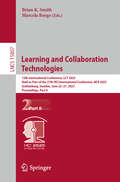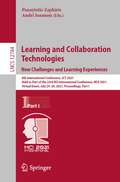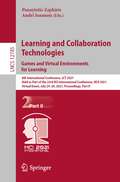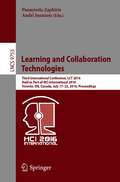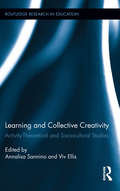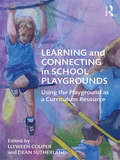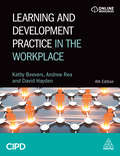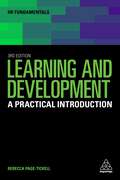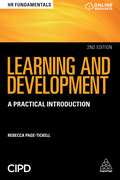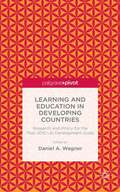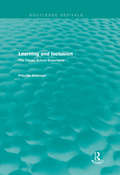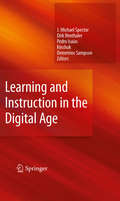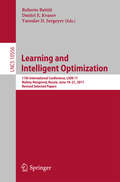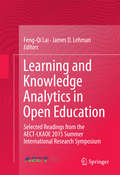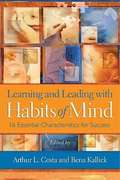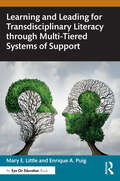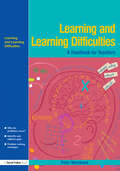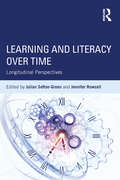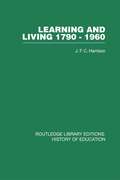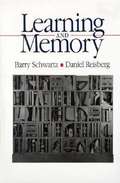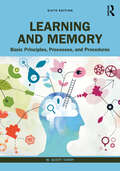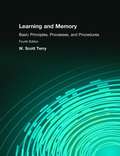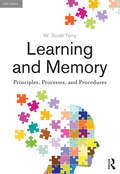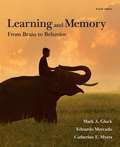- Table View
- List View
Learning and Collaboration Technologies: 12th International Conference, LCT 2025, Held as Part of the 27th HCI International Conference, HCII 2025, Gothenburg, Sweden, June 22–27, 2025, Proceedings, Part II (Lecture Notes in Computer Science #15807)
by Brian K. Smith Marcela BorgeThe three-volume set LNCS 15806–15808 constitutes the thoroughly refereed proceedings of the 12th International Conference on Learning and Collaboration Technologies, LCT 2025, held as part of the 27th International Conference, HCI International 2025, which took place in Gothenburg, Sweden, June 22-17, 2025. The total of 1430 papers and 355 posters included in the HCII 2025 proceedings was carefully reviewed and selected from 7972 submissions. The papers have been organized in topical sections as follows: Part I: Designing Learning Experiences; Technological Innovation in EducationPart II: From Human Teachers to AI Educators; Intelligent Learning Environments Part III: Serious Games and Gamification; Immersive Learning; Understanding Learning Experiences
Learning and Collaboration Technologies: 8th International Conference, LCT 2021, Held as Part of the 23rd HCI International Conference, HCII 2021, Virtual Event, July 24–29, 2021, Proceedings, Part I (Lecture Notes in Computer Science #12784)
by Panayiotis Zaphiris Andri IoannouThis two-volume set LNCS 12784 and 12785 constitutes the refereed proceedings of the 8th International Conference on Learning and Collaboration Technologies, LCT 2021, held as Part of the 23rd International Conference, HCI International 2021, which took place in July 2021. Due to COVID-19 pandemic the conference was held virtually.The total of 1276 papers and 241 poster papers included in the 39 HCII 2021 proceedings volumes was carefully reviewed and selected from 5222 submissions. The regular papers of LCT 2021, Part I, are organized in topical sections named: Designing and Developing Learning Technologies; Learning, Teaching and Collaboration Experiences; On-line vs. in Class Learning in Pandemic Times.
Learning and Collaboration Technologies: 8th International Conference, LCT 2021, Held as Part of the 23rd HCI International Conference, HCII 2021, Virtual Event, July 24–29, 2021, Proceedings, Part II (Lecture Notes in Computer Science #12785)
by Panayiotis Zaphiris Andri IoannouThis two-volume set LNCS 12774 and 12775 constitutes the refereed proceedings of the 8th International Conference on Learning and Collaboration Technologies, LCT 2021, held as Part of the 23rd International Conference, HCI International 2021, which took place in July 2021. Due to COVID-19 pandemic the conference was held virtually. The total of 1276 papers and 241 poster papers included in the 39 HCII 2021 proceedings volumes was carefully reviewed and selected from 5222 submissions. The regular papers of LCT 2021, Part II, focus on Games and Gamification in Learning; Chatbots in Learning; AR, VR and Robots in Learning.
Learning and Collaboration Technologies: Third International Conference, LCT 2016, Held as Part of HCI International 2016, Toronto, ON, Canada, July 17-22, 2016, Proceedings (Lecture Notes in Computer Science #9753)
by Panayiotis Zaphiris Andri IoannouThis book constitutes the refereed proceedings of the Third International Conference on Learning and Collaboration Technologies, LCT 2016, held as part of the 18th International Conference on Human-Computer Interaction, HCII 2016, in Toronto, Canada, in July 2016, in conjunction with 14 thematically similar conferences. The 1287 papers presented at the HCII 2016 conferences were carefully reviewed and selected from 4354 submissions. The papers cover the entire field of human-computer interaction, addressing major advances in knowledge and effective use of computers in a variety of application areas. The papers included in this volume are organized in the following thematic sections: instructional design; interaction techniques and platforms for learning; learning performance; web-based, mobile and ubiquitous learning; intelligent learning environments; learning technologies; collaboration technologies; and cultural and social aspects of learning and collaboration technologies.
Learning and Collective Creativity: Activity-Theoretical and Sociocultural Studies (Routledge Research in Education)
by Viv Ellis Annalisa SanninoThis book brings together leading representatives of activity-theoretically-oriented and socioculturally-oriented research around the world, to discuss creativity as a collective endeavour strongly related to learning to face the societal challenges of our world. As history shows, major accomplishments in arts and technological innovations have allowed us to see the world differently and to identify new learning perspectives for the future which were seldom limited to individual action or isolated activities. This book, while primarily focused on educational insitutions, extends its examination of creativity and learning to include other settings (such as government agencies) beyond the limits of schooling.
Learning and Connecting in School Playgrounds: Using the Playground as a Curriculum Resource
by Llyween Couper Dean SutherlandPlay is critical to children’s well-being and development. All students should have access to and adequate time for positive play experiences every day. Learning and Connecting in School Playgrounds invites parents, teachers, principals and education administrators to take another look at their school playgrounds as spaces crucial to learning, well-being and development. This book combines research findings, commentary and the authors’ personal experiences and observations together with the views of teachers, principals, parents and students related to play and play spaces. Key content includes consideration of the role of adults in the school playground, the influence of technology on play, the challenges experienced by children transitioning to new school environments and consideration of strategies to support students’ access and participation in the playground. Cases are presented to illustrate the use of an audit tool to enhance school playgrounds. The future of school playgrounds is also considered through the reported hopes and dreams of adults and students and a range of recommendations are made for the review and development of schools’ outdoor play spaces. Learning and Connecting in School Playgrounds is written with a sense of urgency, calling for the recognition of positive play experiences as invaluable to children’s education. It includes important and challenging insights to inform and guide decision-making and will be an essential resource for all stakeholders who share responsibility for children’s participation and learning during school break-times.
Learning and Development Practice in the Workplace
by Kathy Beevers Andrew Rea David HaydenLearning and Development Practice in the Workplace is the ideal textbook for anyone studying CIPD L&D qualifications and apprenticeships at Level 3 or Level 5, as well as for practitioners new to an L&D role. It covers what is required of an L&D professional and how to meet and exceed these expectations, how to align L&D activity with organisational strategy and, crucially, how to identify learning needs and design effective L&D practice.This new edition of Learning and Development Practice in the Workplace has been fully updated, reflecting the new CIPD Profession Map, and now has dedicated chapters on the different approaches to learning delivery, including face-to-face training and facilitation, technology-based learning, coaching, mentoring and social and collaborative learning. There is also expert guidance on learner engagement including insights from neuroscience and psychology, as well as advice on evaluating the impact of L&D. With case studies, activities and examples throughout, this new edition is an indispensable guide for students and new practitioners alike. Online supporting resources include lecture slides, annotated web links and self-test questions.
Learning and Development: A Practical Introduction (HR Fundamentals #25)
by Rebecca Page-TickellHow can learning initiatives contribute to employee and organizational success? This is a practical introduction to the principles of designing and delivering effective training and L&D programmes. Providing diagnostic tools, scenarios and case studies, Learning and Development demonstrates how to link learning to strategic business goals and explores both the benefits and complexities associated with L&D. This updated third edition features a new chapter on designing learning interventions, covering technology-led development and the impact of virtual learning. There is also guidance on making learning and development strategies accessible and inclusive for all employees, and information on metrics that can be used for measuring effectiveness.Learning and Development features guidance in essential areas including identifying L&D needs, selecting the most appropriate types of intervention and the processes of measurement and evaluation. Online resources include extended case studies, an annotated literature review and self-evaluation tools.HR Fundamentals is a series of succinct, practical guides featuring exercises, examples and case studies. They are ideal for students and those in the early stages of their HR careers.
Learning and Development: A Practical Introduction (HR Fundamentals #7)
by Rebecca Page-TickellIn today's complex, uncertain and ambiguous business environment, it is essential to develop a workforce's capabilities, skills and competencies to ensure continued organizational success. Learning and Development is a practical guide to the principles of effectively designing and delivering training and L&D programmes in organizations of any size. It demonstrates how to link learning to strategic business goals and explores the benefits of L&D and the complexities associated with it. Using a combination of diagnostic tools, scenarios and case studies, this essential book builds knowledge in areas including identifying L&D needs, selecting the most appropriate types of intervention and the processes of measurement and evaluation.This updated second edition of Learning and Development covers the latest trends and developments in the field, such as e-learning, gamification and massive open online courses (MOOCs), as well as new material on learning measurement and additional international case studies.HR Fundamentals is a series of succinct, practical guides for students and those in the early stages of their HR careers. They are endorsed by the Chartered Institute of Personnel and Development (CIPD), the UK professional body for HR and people development, which has over 145,000 members worldwide.
Learning and Education in Developing Countries: Research and Policy for the Post-2015 UN Development Goals
by Daniel A. WagnerEducation in Developing Countries provides comprehensive and up-to-date review of learning and educational quality in developing countries, written by highly knowledgeable specialists from around the world. The areas reviewed include early literacy, new technologies, conflict-affected contexts, non-formal education, and learning assessment, and are among the most crucial for policy makers from ministers of education, development agencies to academic specialists and students in international educational development. Working with the UN Millennium Development Goals to improve educational quality, this cutting edge, research-based review helps to situate what is known and remains to be known to improve education globally. "
Learning and Inclusion: The Cleves School Experience (Routledge Revivals)
by Priscilla AldersonMainstream schools are consistently faced with numerous and often contradictory requirements, both to achieve high results and to be inclusive and incorporate children of every ability. This title, first published in 1999, describes how one renowned inclusive community school, Cleves School, responds to the challenges faced by themselves and other schools. Specifically, Priscilla Alderson shows how methods of inclusive learning can be incorporated with those designed to improve standards of achievement for every child. Practical and comprehensive, this title remains applicable to the challenges currently faced within the British education system.
Learning and Instruction in the Digital Age
by J. Michael SpectorInstruction tailored to the individual student, learning and teaching outside the limits of time and space--ideas that were once considered science fiction are now educational reality, with the prospect of an intelligent Web 3.0 not far distant. Alongside these innovations exists an emerging set of critical-thinking challenges, as Internet users create content and learners (and teachers) take increased responsibility in their work. Learning and Instruction in the Digital Age nimbly balances the technological and pedagogical aspects of these rapid changes, gathering papers from noted researchers on a wealth of topics relating to cognitive approaches to learning and teaching, mental models, online learning, communications, and innovative educational technologies, among them: Cognition and student-centered, Web-based learning, The progression of mental models throughout a course of instruction, Experiencing education with 3D virtual worlds, Expanding educational boundaries through multi-school collaboration, Adapting e-learning to different learning styles, The student blog as reflective diary. With its blend of timely ideas and forward thinking, Learning and Instruction in the Digital Age will enrich the work of researchers in educational psychology, educational technology, and cognitive science.
Learning and Intelligent Optimization
by Yaroslav D. Sergeyev Dmitri E. Kvasov Roberto BattitiLION 4, the 4th International Conference on Learning and Intelligent Op- mizatioN, was held during January 18-22 in Venice, Italy. This meeting, which continues the successful series of LION conferences, was aimed at exploring the intersectionsand uncharted territoriesbetween machine learning,arti?cial int- ligence, mathematical programming and algorithms for hard optimization pr- lems. The main purpose of the event was to bring together experts from these areas to discuss new ideas and methods, challenges and opportunities in various application areas, general trends and speci?c developments. Despite the economical crisis in 2009, which visibly a?ected the submission numbers of many conferences and workshops, we received an impressive n- ber of 87 submissions. As in previous years, we o?ered three di?erent paper categories for submission: (1) regular papers on original and unpublished work, (2)shortpapersonoriginalandunpublishedwork,and(3)worksfororalpres- tation only. Accepted papers from the ?rst two categories are published in the proceedings. Fromthe 87 submissions that wereceived,57 fell into the ?rstca- gory, 22 into the second one, and 8 into the last one. After a thorough reviewing process we accepted 19 regular papers (which amounts to an acceptance rate of 33%) and 11 short papers for publication in the proceedings. Additionally, nine regular paperswere accepted as shortpapers, and all eight submissions from the third category were accepted for presentation.
Learning and Knowledge Analytics in Open Education
by Feng-Qi Lai James D. LehmanThis book explores trends in learning and knowledge analytics in open education, as explored in proceedings papers from AECT-LKAOE 2014 International Research Symposium. The chapters investigate various issues surrounding open education in all disciplines, such as learning design in open-ended learning environments, MOOCs (Massive Open Online Courses), learning analytics studies and applications, and technology and new media. The chapter authors provide guidance for how to design and develop most effective, efficient, and appealing instruction as well as suggesting learning strategies relevant to the open education era.
Learning and Leading With Habits of Mind: 16 Essential Characteristics for Success
by Arthur L. Costa Bena KallickIn Learning and Leading with Habits of Mind, noted educators Arthur L. Costa and Bena Kallick present a comprehensive guide to shaping schools around Habits of Mind. The habits are a repertoire of behaviors that help students and teachers successfully navigate the various challenges and problems they encounter in the classroom and in everyday life. The Habits of Mind include: Persisting, Managing impulsivity, Listening with understanding and empathy, Thinking flexibly, Thinking about thinking (metacognition), Striving for accuracy, Questioning and posing problems, Applying past knowledge to new situations, Thinking and communicating with clarity and precision, Gathering data through all senses, Creating, imagining, innovating, Responding with wonderment and awe, Taking responsible risks, Finding humor, Thinking interdependently, Remaining open to continuous learning.
Learning and Leading for Transdisciplinary Literacy through Multi-Tiered Systems of Support
by Mary E. Little Enrique A. PuigThis comprehensive guide gives an overview of Multi-Tiered Systems of Support (MTSS) for K-12 teacher leaders and other school professionals with practices toward achieving transdisciplinary success for lifelong literacy in schools. MTSS is a holistic teacher leadership approach that focuses on transdisciplinary networks of instruction and intervention. For MTSS to be effective, teacher-colleagues and teacher leaders need to be prepared to understand the complexities of the systems and the multiple tiers of support needed within each system, as well as their roles in the process.This book details an illustrative list of tiers for seven systems within an MTSS framework, including multi-tiered systems for: Assessment and Evaluation Professional Learning (e.g., literacy coaches, literacy leadership teams, online/offline professional learning) Family Engagement (e.g., newsletters, parent nights, parent workshops, Parent–Teacher Associations) Transdisciplinary Curriculum Content (e.g., media centers, leveled book rooms, schools, districts, and state resource teachers) Community Engagement (e.g., social services, school outreach, counseling services, health services) Distributive Teacher Leadership (e.g., School Advisory Committee, college/university courses, professional pathways) Response to Intervention/Instruction With examples of instructional practices, connections to researched resources, and implementational plans, this book will be useful for teacher leaders, literacy coaches, and curriculum leaders, as well as school board officials and school administrators, to leverage their knowledge and skills for transdisciplinary literacy learning in their schools.
Learning and Learning Difficulties: Approaches to teaching and assessment
by Peter WestwoodThis book supports inclusive practice by examining learning difficulties within the context of how humans learn and how teaching can create or prevent problems. It includes: a detailed look at different perspectives on human learning practical teaching approaches grounded in sound theory information on moderate to sever difficulties in literacy and numeracy. This is an essential reference for SENCOs, staff working as part of a support unit or in special schools, LEA advisers, teachers and TAs.
Learning and Literacy over Time: Longitudinal Perspectives
by Julian Sefton-Green Jennifer RowsellLearning and Literacy over Time addresses two gaps in literacy research—studies offering longitudinal perspectives on learners and the trajectory of their learning lives inside and outside of school, and studies revealing how past experiences with literacy and learning inform future experiences and practices. It does so by bringing together researchers who revisited subjects of their initial research conducted over the past 10-20 years with people whom they encountered through ethnographic or classroom-based investigations and are the subjects of previous published accounts. The case studies, drawn from countries in three continents and covering a range of social worlds, offer an original and at times quite an emotive interpretation of the effects of long-term social change in the UK, the US, Australia and Canada; the claims and aspirations made by and for certain kinds of educational interventions; how research subjects reflect on and learn from the processes of being co-opted into classroom research as well as how they make sense of school experiences; some of the widespread changes in literacy practices as a result of our move into the digital era; and above all, how academic research can learn from these life stories raising a number of challenges about methodology and our claims to 'know’ the people we research. In many cases the process of revisiting led to important reconceptualizations of the earlier work and a sense of 'seeing with new eyes’ what was missed in the past. The reflections on methodology and research processes will interest postgraduate and academic researchers. The studies of change and of long-term effects are widely relevant to teacher educators and scholars in language and literacy education, educational anthropology, life history research, media and cultural studies, and sociology.
Learning and Living 1790-1960: A Study in the History of the English Adult Education Movement
by J F HarrisonOriginally published in 1961, the book charts the dynamics of successive phases of the adult education movement and shows the social origin and development of the ideas and attitudes of those involved with it.
Learning and Memory 1st Edition
by Barry Schwartz Daniel ReisbergThis book illustrates how various topics in learning and memory are related.
Learning and Memory: Basic Principles, Processes, and Procedures
by W. Scott TerryLearning and Memory provides a balanced review of the core methods and the latest research on animal learning and human memory. Topical coverage ranges from the basic and central processes of learning, including classical and instrumental conditioning and encoding and storage in long-term memory, to topics not traditionally covered, such as spatial learning, motor skills, and implicit memory. The general rules of learning are reviewed along with the exceptions, limitations, and best applications of these rules. Alternative approaches to learning and memory, including cognitive, neuroscientific, functional, and behavioral, are also discussed. Individual differences in age, gender, learning abilities, and social and cultural background are explored throughout the text and presented in a dedicated chapter. The relevance of basic principles is highlighted throughout the text with everyday examples that ignite reader interest in addition to more traditional examples from human and animal laboratory studies. Research examples are drawn from education, neuropsychology, psychiatry, nursing, and ecological (or everyday) memory. Each chapter begins with an outline and concludes with a detailed summary. Applications and extensions are showcased in text boxes as well as in distinct applications sections in every chapter, and review and recapitulation sections are interspersed throughout the chapters.
Learning and Memory: Basic Principles, Processes, and Procedures (4th Edition)
by W. Scott TerryThis text explores the core principles of learning and memory in a clear, reader-friendly style, covering animal learning and human memory in a balanced fashion.
Learning and Memory: Basic Principles, Processes, and Procedures (Fifth Edition)
by W. Scott Terry<p>This thoroughly updated edition provides a balanced review of the core methods and the latest research on animal learning and human memory. The relevance of basic principles is highlighted throughout via everyday examples to ignite student interest, along with more traditional examples from human and animal laboratory studies. Individual differences in age, gender, learning style, cultural background, or special abilities (such as the math gifted) are highlighted within each chapter to help students see how the principles may be generalized to other subject populations. <p>The basic processes of learning – such as classical and instrumental conditioning and encoding and storage in long-term memory in addition to implicit memory, spatial learning, and remembering in the world outside the laboratory – are reviewed. The general rules of learning are described along with the exceptions, limitations, and best applications of these rules. The relationship between the fields of neuropsychology and learning and memory is stressed throughout. <p>The relevance of this research to other disciplines is reflected in the tone of the writing and is demonstrated through a variety of examples from education, neuropsychology, rehabilitation, psychiatry, nursing and medicine, I/O and consumer psychology, and animal behavior. <p>Each chapter begins with an outline and concludes with a detailed summary. A website for instructors and students accompanies the book. Updated throughout with new research findings and examples the new edition features: <p> <li>A streamlined presentation for today’s busy students. As in the past, the author supports each concept with a research example and real-life application, but the duplicate example or application now appears on the website so instructors can use the additional material to illustrate the concepts in class. <li>Expanded coverage of neuroscience that reflects the current research of the field including aversive conditioning (Ch. 5) and animal working memory (Ch. 8). <li>More examples of research on student learning that use the same variables discussed in the chapter, but applies them in a classroom or student’s study environment. This includes research that applies encoding techniques to student learning, for example: studying: recommendations from experts (Ch. 1); the benefits of testing (Ch. 9); and Joshua Foer’s Moonwalking with Einstein, on his quest to become a memory expert (Ch. 6). <li>More coverage of unconscious learning and knowledge (Ch. 11). <li>Increased coverage of reinforcement and addiction (Ch. 4), causal and language learning (Ch. 6), working memory (WM) and the effects of training on WM, and the comparative evolution of WM in different species (Ch. 8), and genetics and learning (Ch. 12).</li>
Learning and Memory: From Brain To Behavior
by Eduardo Mercado Mark Gluck Catherine MyersWith real-world examples, fascinating applications, and clear explanations, this breakthrough text helps uninitiated students understand the basic ideas and human impact of groundbreaking learning and memory research. Its unique organization into three sections—Behavioral Processes, Brain Substrates, and Clinical Perspectives—allows students to make connections across chapters while giving instructors the flexibility to assign the material that matches the course. The new edition again offers the book’s signature inclusion of human and non-human studies and full-color design and images. You’ll find even more meaningful real-life examples; new coverage of learning and memory research and brain-imaging; an expanded discussion of the role of genetics in producing individual differences; new material on the role of sleep in memory, and more.
Learning and Memory: From Brain to Behavior (Second Edition)
by Mark A. Gluck Eduardo Mercado Catherine E. MyersDevelopments in neuroscience have changed the field of learning and memory significantly in the last ten years. This comprehensive introduction to learning and memory covers behavioural processes, brain systems, and clinical perspectives.
